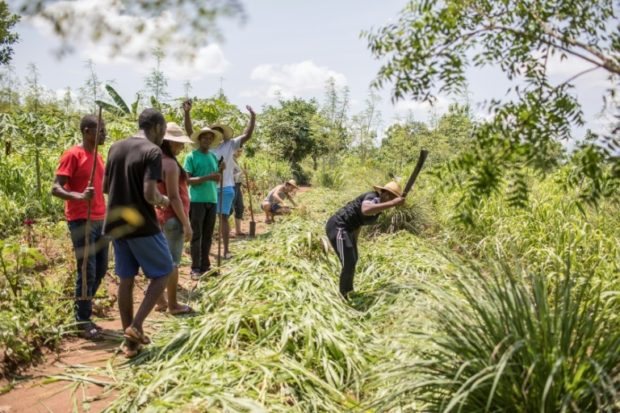West African farm ‘bootcamp’ gets green entrepreneurs into shape

The program aims to teach basic, traditional ways of agriculture to those who have forgotten or never known a life on the land. Image: AFP/Yanick Folly
Machetes in hand and wearing a straw hat against the sun, the participants of an “agro-bootcamp” in the farmlands of the West African nation of Benin harvest maize, cowpeas and rice.
“Cut at the base,” said Oluwafemi Kochoni, an organic farming teacher, who runs the agricultural workshop to prepare young people for a future sustainably working the land.
“Then leave the plants in place, we will bury them, they will decompose and fertilize the soil.”
It’s beginner’s advice but the program in Tori-Bossito, just outside Benin’s economic capital Cotonou, aims to teach basic, traditional ways of agriculture to those who have forgotten or never known life on the land.
In Benin, a poor country next to oil giant Nigeria, some 80% of its 11 million people depend on agriculture, according to the United Nation’s Food and Agriculture Organization (FAO).
“Most are subsistence farmers eking out a living growing crop on small plots where a lack of infrastructure and flooding that can wipe out harvests and seed stocks are key challenges,” the FAO warned.
But the “agro-bootcamps,” the name is borrowed from the intensive training of the United States army, take place close to the suburbs of the city and are aimed at a different market.
They are part of a wider movement to encourage self-sufficiency on the continent, which has some two-thirds of the world’s remaining uncultivated arable land, but spends $64.5 billion a year importing food, according to the African Development Bank.
For 27,000 CFA francs a week, agro-bootcampers learn agricultural techniques, follow marketing courses and can network with successful agro-entrepreneurs.
‘Ecologically-aware business people’
Like in traditional farming, the agro-bootcamp way of life is communal on the three-hectare (seven-acre) plot of land put at its disposal for the week by a family in exchange for baskets of vegetables.
On the edge of the fields, a border hedge of moringa plants and grasses are grown to help stabilize the soil.
There is also a fish farm in a pond, and another area to grow mushrooms.
Behind the scheme is the Gardens of Hope, an organization promoting sustainable ways of farming.
“The advice usually received by farmers is based on the use of chemicals,” said participant Rachidi Idrissou, an agronomy student in Benin. “We think of quick yields and not sustainable production to preserve our land.”
Benin is a youthful country, nearly two-thirds of the population is aged under 25.
Camp organizers want to show young people struggling in crowded cities looking for a job that working the land can offer an alternative and successful livelihood.
Originating from Africa and Europe, the 25 participants in this third agro-bootcamp are mostly men and of eight different nationalities but share a vision of an ecological and sustainable way of farming.
They sleep in tents and are kept busy from dawn until long after dusk.
“Our belief is that to solve the employment problem in our countries, young people must create their businesses with an awareness of ecology of the climate,” coordinator Tanguy Gnikobou said.
‘A philosophy’
Of the 85 people who have taken part in the last two bootcamps, 10 have already launched new agricultural activities, farms or enterprises, according to organizers.
Social networks mean that participants and organizers can stay in touch for support as they develop their farms and small businesses.
Participants farm in ways farmers did before the massive movement of people to the cities.
“Initially, it was an alternative to conventional farming, to return to ancestral methods with the respect of the environment,” Kochoni said. “Then it became a way of life, and a philosophy.”
More camps are planned for later in the year in north Benin, then in Chad and Ivory Coast.
Cheikh Amadou Bass, 36, a civil servant in Nouakchott, capital of the desert nation of Mauritania, owns a large plot of land the size of five football pitches in his home village.
Bass dreams of showing his young compatriots that rather than crossing the sea in search of a new life abroad, there are opportunities on the land.
“With nature, you have everything at your fingertips,” said Bass, enthusing about how manure means chemical fertilizers are not needed.
“I have made a great discovery,” he added. HM/JB
RELATED STORIES:
Keep Mt. Kilimanjaro cable car-free, online petition asks Tanzania gov’t